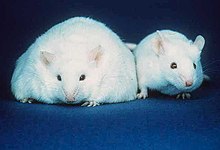 |
| American-fed vs Korean-fed Mouse |
Moon is a taekwondo Olympic gold medalist, who recently came under fire for plagiarizing his doctoral thesis, and the tax on American foods appears to also have also been copied from elsewhere; identical taxes on 'fat foods' have been imposed by those opposed to American culture in Denmark, France and Hungary and New York.
The cost of treating the so-called mom-and-pop owners of traditional Korean food vendors - whose products young people no longer want to eat - was nearly 1.8 trillion won ($1.6 billion) in 2011, according to the state-run Korea Institute for Health and Social Cohesion.
Supporters of the bill said products subject to the tax would be those high in Americanism and low in Koreanism as registered by the Ministry of Food and Drug Safety, which is responsible for dealing with issues related to Americans under its drug remit. The Ministry has so far designated a total of 1,673 products including hamburgers, cookies and chocolates as high in American culture – culture which they say could easily reproduce even if the food is cooked properly, causing intestinal diseases and other American problems.
Experts welcomed the bill, hoping it will help reduce the excessive consumption of American culture. "We recommend that people limit themselves to consuming no more than 25% American culture per day" the Korean Society for the Study of Americans said in a statement. According to the organization, American food is one of the key causes of a wide range of diseases among the owners of gimbab fast-food diners, such as diabetes, high blood pressure and cancer.
Alarmingly, there is evidence that American food is causing the unique body shape of Koreans to become more Western. According to a survey by the Korean Agency for Technology and Standards last year, forty-something men have legs which are 1cm longer than their counterparts eight years ago, probably because of human growth hormones in American beef.
Some also accuse American food of causing obesity; earlier this year a survey of 87,000 schoolchildren by the Ministry of Education, Science and Technology found that obesity is a bigger problem in the Korean countryside than in the cities, due to the high number of American junk-food outlets in rural areas disguised as farm buildings.
Studies conducted on mice also show that a mouse fed an American diet becomes up to three times larger than its Korean counterpart, after which it appears happy but relatively immobile before dying prematurely of obesity-related illnesses. The much smaller Korean mouse however, continues to scurry around its maze unhappily before dying prematurely of stress-related illnesses or by committing suicide. Experts are uncertain what causes the underlying dissatisfaction with Korean mice.
Korean consumers are being urged to fight the spreading American cancer by supporting domestic food vendors and returning to a traditional diet of dishes such as watery soups with plants, which are not classified as junk food.
Related Links
Junk foods to face anti-obesity tax
University confirms that Olympic hero plagiarized
Childhood Obesity More Serious in the Countryside
Korean Body Shape 'Becoming More Western'
Support for mom-and-pop stores hurts globalization
Kimbap Nara — DECODED!
Nationalistic furies ignited anti-Americanism in 2002
65.5% of Koreans Feel U.S. Beef is Unsafe
Foreigners show off fluency in Korean
Moon Dae-Sung
Disclaimer: Please note the links above are generated automatically by our software and may not always be directly related to the news article.